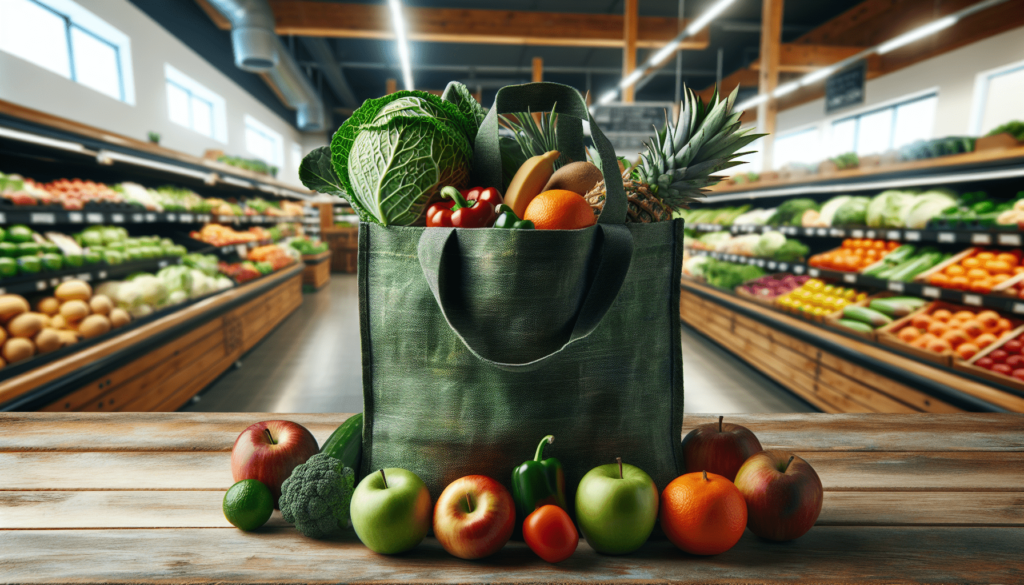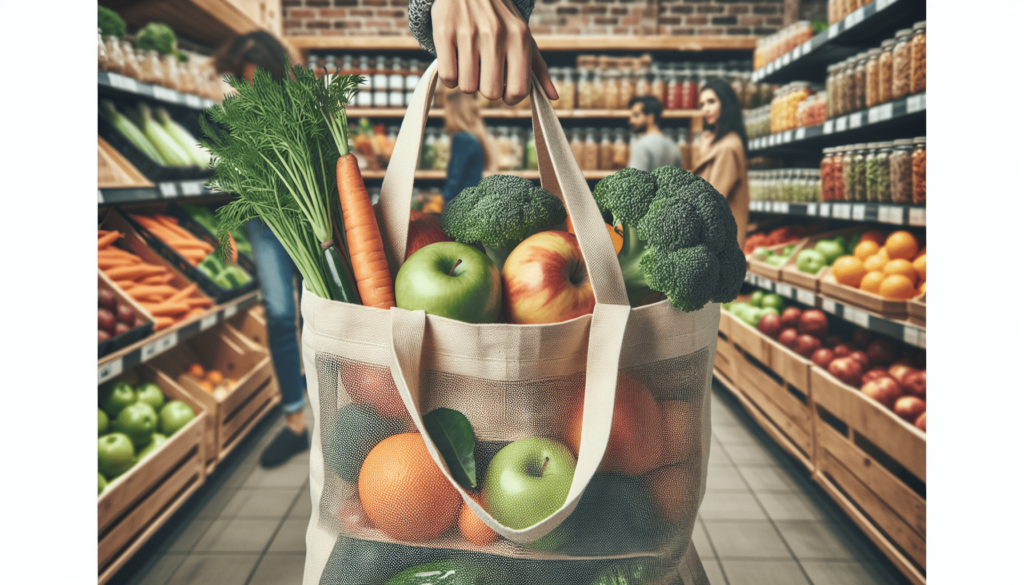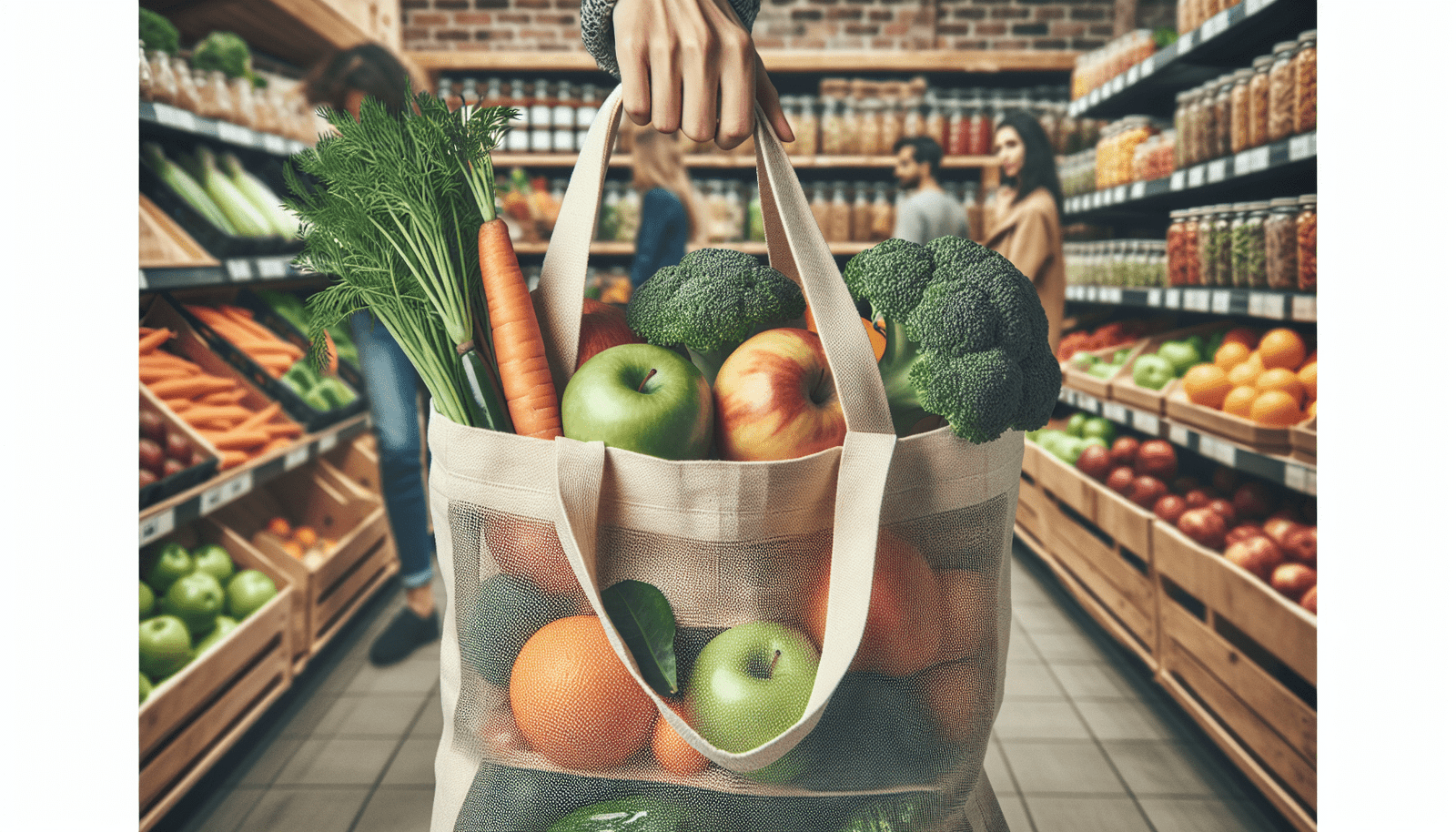Are you passionate about living a greener and more sustainable lifestyle? Do you want to make a positive impact on the environment while also saving some green in your wallet? Look no further! In this article, we will provide you with 5 valuable tips for eco-conscious grocery shopping. By making small changes in your shopping habits, you can contribute to a healthier planet and enjoy the financial benefits of going green. So, get ready to embark on a sustainable journey and learn how to make environmentally-friendly choices at the grocery store.

1. Bring Your Own Bags
Invest in reusable bags
One simple and effective way to reduce your environmental impact while grocery shopping is by investing in reusable bags. These bags are typically made from durable materials like canvas or nylon, making them perfect for carrying your groceries time and time again. By using reusable bags, you can eliminate the need for single-use plastic bags, which often end up in landfills or polluting our oceans. Plus, many grocery stores offer incentives for bringing your own bags, such as discounts or loyalty points, so you can save money while saving the planet.
Keep them handy
To make sure you always have your reusable bags on hand when you need them, it’s helpful to keep them in a convenient location. Consider storing them in the trunk of your car or by the front door so you can easily grab them before heading to the store. You can also keep a few smaller, foldable bags in your purse or backpack for unexpected trips to the grocery store. By keeping your reusable bags handy, you’ll never have to rely on single-use plastic bags again.
Remember to wash them
While reusable bags are a fantastic eco-friendly alternative to plastic bags, it’s important to remember to wash them regularly. Over time, your reusable bags can accumulate dirt, bacteria, and even food residue, which can become a breeding ground for germs. To keep your bags clean, simply toss them in the washing machine on a gentle cycle or hand wash them with mild soap and water. By washing your reusable bags, you can ensure they stay fresh and sanitary, making them a safe and sustainable choice for grocery shopping.
2. Buy Local and Seasonal Produce
Support local farmers
One of the best ways to reduce your carbon footprint and support your community is by buying local produce. When you buy from local farmers, you’re not only getting fresh, high-quality fruits and vegetables, but you’re also reducing the distance that your food needs to travel to reach your plate. This means less fuel consumption and greenhouse gas emissions, ultimately helping to combat climate change. Additionally, buying local produce helps support local farmers and the local economy, ensuring that these valuable resources continue to thrive.
Reduce carbon footprint
By choosing local and seasonal produce, you can significantly reduce your carbon footprint. Conventionally grown fruits and vegetables often travel long distances to reach your local grocery store, resulting in increased fuel consumption and emissions. On the other hand, local and seasonal produce is typically grown closer to home, cutting down on transportation-related emissions. By opting for local and seasonal options, you can help combat climate change and promote a more sustainable food system.
Choose seasonal fruits and vegetables
When it comes to buying produce, it’s important to choose fruits and vegetables that are in season. Seasonal produce is not only fresher and tastier, but it also requires fewer resources to grow. Choosing seasonal options helps reduce the need for extensive irrigation, artificial lighting, and chemical pesticides, resulting in a more eco-friendly agricultural system. Plus, seasonal produce is often more affordable, making it a win-win for both your wallet and the planet.
Visit farmers markets
One of the best ways to find local and seasonal produce is by visiting farmers markets. Farmers markets offer a wide variety of locally grown fruits, vegetables, and other artisanal products. They provide a direct connection between consumers and farmers, allowing you to ask questions about farming practices, learn more about where your food comes from, and support small-scale agriculture. Additionally, farmers markets often have a vibrant atmosphere, with live music, food trucks, and other community events, making grocery shopping a fun and enjoyable experience.

3. Reduce Food Waste
Plan meals in advance
One of the most effective ways to reduce food waste is by planning your meals in advance. By taking the time to create a weekly meal plan, you can ensure that you only buy the ingredients you need and avoid purchasing items that may go to waste. Start by making a list of meals you want to prepare for the week, taking into account any leftovers or ingredients you already have on hand. This way, you can buy the right quantities of food and minimize the amount of food that ends up in the trash.
Make a shopping list
Another essential tool for reducing food waste is a shopping list. Before heading to the grocery store, take a few minutes to write down the items you need for your planned meals. Stick to your list while shopping and try to avoid impulse purchases. By shopping with a list, you can stay focused, avoid buying unnecessary items, and ultimately reduce the amount of food that goes uneaten.
Only buy what you need
When grocery shopping, it’s important to resist the temptation to buy more than you need. Many people tend to overestimate the amount of food they will consume, leading to excess leftovers and wasted ingredients. Be mindful of portion sizes and buy only the quantities that you and your household will realistically consume. By being conscious of your purchasing habits, you can minimize food waste and save money in the process.
Store food properly
Proper storage is crucial for extending the shelf life of your groceries and preventing food waste. Make sure to store perishable items like fruits, vegetables, and dairy products in the refrigerator to maintain their freshness. Invest in quality food storage containers and use them to organize your leftovers, allowing you to easily see what needs to be eaten before it spoils. Additionally, learn about the best storage practices for different types of produce to maximize their longevity.
Use leftovers creatively
Leftovers don’t have to be boring or go to waste. Get creative in the kitchen and find new ways to use your leftovers in exciting and delicious recipes. For example, leftover chicken can be transformed into a flavorful soup or sandwich filling, while overripe bananas can be transformed into a batch of delicious banana bread. By using your leftovers creatively, you can reduce food waste and save money on groceries.

4. Choose Organic and Sustainable Products
Look for organic certifications
Organic products are grown and produced without the use of synthetic pesticides, herbicides, and fertilizers. When shopping for groceries, look for products that have the organic certification label, such as USDA Organic or Canada Organic. These certifications ensure that the product meets strict organic standards and has been produced in an environmentally conscious manner. By choosing organic products, you can support sustainable farming practices and reduce your exposure to harmful chemicals.
Consider sustainable packaging
In addition to choosing organic products, it’s also important to consider the packaging of the items you buy. Look for products that use minimal or recyclable packaging materials, such as glass, paper, or cardboard. Avoid products that are excessively packaged in single-use plastics, as these contribute to our growing waste problem. By making conscious decisions about packaging, you can help reduce the demand for unsustainable packaging materials and support companies that prioritize eco-friendly alternatives.
Avoid genetically modified organisms (GMOs)
Genetically modified organisms (GMOs) have been genetically altered in a laboratory, often to make them resistant to pests or herbicides. While the long-term effects of GMO consumption are still being studied, many people prefer to avoid these modified organisms and opt for non-GMO products instead. Look for products that are labeled as non-GMO or GMO-free to ensure that you are making a conscious choice. By avoiding GMOs, you can support sustainable farming practices and encourage transparency in the food industry.
Support eco-friendly brands
When choosing grocery products, consider supporting brands that prioritize sustainability and environmental responsibility. Look for brands that use renewable energy sources, practice water conservation, or support fair trade practices. Many companies now proudly display their eco-friendly initiatives and certifications on their packaging or websites. By supporting these brands, you can make a positive impact by voting with your wallet and encouraging more companies to adopt sustainable practices.

5. Minimize Single-Use Plastics
Use reusable produce bags
Instead of relying on single-use plastic bags in the produce section, opt for reusable produce bags. These lightweight, washable bags are perfect for holding fruits, vegetables, and other loose items. They are often made from materials like mesh or cotton, allowing you to easily see the contents inside. By using reusable produce bags, you can eliminate the need for countless plastic bags that often end up in landfills or as litter in our environment.
Avoid purchasing bottled water
One of the easiest ways to reduce your consumption of single-use plastics is by avoiding bottled water. Instead of buying individual plastic water bottles, invest in a reusable water bottle that you can refill throughout the day. Many cities and towns have public water fountains or refill stations where you can easily access clean drinking water. By refusing plastic bottled water, you can help reduce the staggering amount of plastic waste generated by this industry.
Bring your own reusable water bottle
To stay hydrated while on the go, make it a habit to bring your own reusable water bottle with you. Whether you’re headed to work, the gym, or running errands, having a refillable bottle will save you money and reduce your environmental impact. Choose a bottle made from a durable material like stainless steel or glass, and make sure it’s BPA-free for your safety. With your trusty reusable water bottle by your side, you’ll never have to rely on single-use plastic water bottles again.
Choose bulk options
Another way to minimize single-use plastics is by choosing bulk options whenever possible. Instead of buying individually packaged items, look for bulk bins or bulk sections in your local grocery store. By buying in bulk, you can reduce packaging waste and only purchase the quantities you need. Bring your own reusable containers or bags and fill them up with grains, nuts, dried fruits, and other pantry staples. This not only reduces plastic waste but can also save you money in the long run.
Say no to plastic straws and utensils
Plastic straws and utensils are a major contributor to plastic pollution, often ending up in our oceans and harming marine life. Whenever you order a drink or takeout meal, make a habit of saying no to plastic straws and utensils. Instead, carry your own reusable straw and utensils with you. There are many options available, including stainless steel, bamboo, or even collapsible utensil sets that are easy to carry in your bag or pocket. By saying no to single-use plastic straws and utensils, you can make a significant impact in reducing plastic waste and protecting our planet.
In conclusion, eco-conscious grocery shopping is a small but important step towards creating a more sustainable and environmentally friendly world. By bringing your own bags, buying local and seasonal produce, reducing food waste, choosing organic and sustainable products, and minimizing single-use plastics, you can make a positive impact on the planet and reduce your carbon footprint. So the next time you head to the grocery store, keep these tips in mind and make choices that align with your values of sustainability and conservation. Happy shopping!

